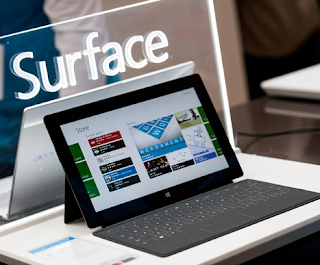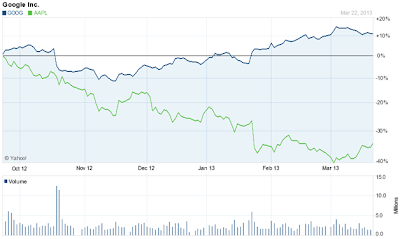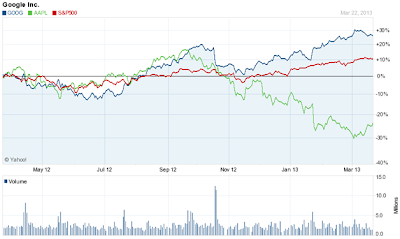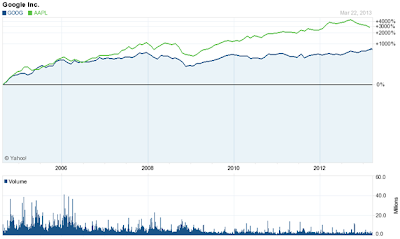 Last Monday evening, Senators Carl Levin and John McCain slammed Apple (Nasdaq: AAPL) and seemed to imply the company was un-American in alleged tax avoidance. The Senate Permanent Subcommittee on Investigations published a statement Monday night along with a 40-page memorandum with its findings and recommendations. A hearing followed on Tuesday, with Apple CEO Tim Cook and other executives facing a barrage of questions that attempted to find fault with Apple. The Senate is alleging that Apple has actively sought to avoid paying taxes. That very well may be true, but it is only excessive taxes that Apple is avoiding, and that does not make Apple un-American. After all, doesn’t every American seek to pay as few dollars in taxes as is legally possible? After my own study of the situation, I’ve concluded that Apple has done absolutely nothing wrong. Furthermore, I assess that Apple has no unfair advantage over smaller competitors in the United States because of the construct of its holding companies, as Senator McCain suggested it might. Finally, Apple CEO Tim Cook scored highly in the defense of his company, and so Apple should remain a favorite of patriotic Americans.
Last Monday evening, Senators Carl Levin and John McCain slammed Apple (Nasdaq: AAPL) and seemed to imply the company was un-American in alleged tax avoidance. The Senate Permanent Subcommittee on Investigations published a statement Monday night along with a 40-page memorandum with its findings and recommendations. A hearing followed on Tuesday, with Apple CEO Tim Cook and other executives facing a barrage of questions that attempted to find fault with Apple. The Senate is alleging that Apple has actively sought to avoid paying taxes. That very well may be true, but it is only excessive taxes that Apple is avoiding, and that does not make Apple un-American. After all, doesn’t every American seek to pay as few dollars in taxes as is legally possible? After my own study of the situation, I’ve concluded that Apple has done absolutely nothing wrong. Furthermore, I assess that Apple has no unfair advantage over smaller competitors in the United States because of the construct of its holding companies, as Senator McCain suggested it might. Finally, Apple CEO Tim Cook scored highly in the defense of his company, and so Apple should remain a favorite of patriotic Americans.
 Our founder earned clients a 23% average annual return over five years as a stock analyst on Wall Street. "The Greek" has written for institutional newsletters, Businessweek, Real Money, Seeking Alpha and others, while also appearing across TV and radio. While writing for Wall Street Greek, Mr. Kaminis presciently warned of the financial crisis.
Our founder earned clients a 23% average annual return over five years as a stock analyst on Wall Street. "The Greek" has written for institutional newsletters, Businessweek, Real Money, Seeking Alpha and others, while also appearing across TV and radio. While writing for Wall Street Greek, Mr. Kaminis presciently warned of the financial crisis.
Apple Un-American?
The taxes in question are on monies earned overseas, which have already been taxed in the nations within which they have been earned. Apple (Nasdaq: AAPL) is simply choosing to keep capital in one overseas location, Ireland, instead of within many individual nations. And it is not sending excess cash home, due to the unreasonable 35% tax rate it would be forced to pay for simply repatriating the capital. So Apple (AAPL) is basically saving money for its shareholders with smart tax planning. It’s a two-pronged strategy. Apple is avoiding paying excess taxes to Ireland, first and foremost. Secondarily, it is not costing its shareholders unnecessarily by sending excess cash back to the U.S. for extra taxation. However, Apple does pay taxes on the income it earns on the investment of its money in Ireland.
What bothers regulators most is that it appears to them that Apple has gamed the tax laws of the United States and Ireland in order to exempt itself from paying taxes to either nation. In effect, it has placed three subsidiaries in a sort of state of tax limbo, with no nation having legal right to any taxes on hundreds of billions of what could have unnecessarily become taxable income if Apple sent the money home.
The details of the game work like this. Because Apple’s subsidiaries, Apple Operations International (AOI) and Apple Sales International (ASI), are incorporated in Ireland, they are free of the legal reach of the U.S. tax authority. And because these subsidiaries are managed and controlled (an Irish tax concept) by the parent company, which is located outside of Ireland, they are exempt of legal tax obligation to Ireland as well. A third subsidiary with no legal tax residency status, Apple Operations Europe (AOE), has reportedly helped the company to save some more money. According to the Senators, from 2009 to 2012, the company’s tax haven constructs have allowed it to save approximately $44 billion in taxes. Senator Levin seemed to imply that the holding companies are merely for show, set up as tax havens, by asking Apple’s somewhat shaken Tax Operations Head, Phillip Bullock, where the operations were truly “managed and controlled” from. Bullock and Cook fended him off well though, because they made both legal and logical sense. The companies are operated out of Ireland, but of course, the final say and direction comes from California.
Now, no matter how badly the United States could use these funds today, they are not really due to our nation. After all, these are monies earned on overseas sales, and so fall under the jurisdiction of other nations, and taxes are paid to those nations. Senator Levin of Michigan said Apple sought the
“Holy Grail of tax avoidance,” by levering tax loopholes to avoid paying any taxes anywhere. Senator McCain said,
“The proper place for the bulk of Apple’s creative energy ought to go into its innovative products and services, not in its tax department.” He also noted that even though Apple brags about being one of America’s most important corporate tax payers, it is also one of its greatest tax avoiders. With all due respect to Senator Levin, whom I’m glad is serving our nation and in the role he is serving, because of his shrewd legal sense, I have determined that these allegations are exaggerations of reality. Also, in my view, Senator McCain was not fully committed to fighting this battle yet, and open to discussion.
According to the Senate’s inquiries, Apple along with many other large corporations like Microsoft (Nasdaq: MSFT), Hewlett-Packard (NYSE: HPQ) and others have avoided paying taxes. Yes, I agree that Apple has avoided paying them
to Ireland, thanks to Irish tax law, and that Apple has returned value to its shareholders instead. Many if not most of those equity stakeholders are found on American soil and have benefited from those saved dollars or euros. Unfortunately, in the end, what the government may actually accomplish is to embolden and empower the EU to flex its muscle against these important American companies. Recently, at one of its meetings, G7 members agreed to target tax evasion, and look what the
Irish Times published last week. Are we now handing them Apple on a stick?
Because of the importance of these companies, they have leveraged their influence to gain favorable tax deals in exchange for placing stakes into the ground of nations like Ireland, who are willing and welcome to them. In return, the company employs people in those nations and makes those nations more marketable to other companies. It also encourages domestic businessmen to stay home when incorporating. So, it is not just a matter of taking; Apple and others also return something of value to nations like Ireland. Also, I gleaned from the inquiry that Apple does pay something on the order of 2% to Ireland by contract negotiated between the nation and the company. It seems that Apple has managed to leverage some of its own strength to bless Ireland with its presence. Plus, it employs roughly 4,000 Irishmen.
In this case, I think the government is wrong in its implication of wrongdoing. Furthermore, John McCain’s suggestion that Apple has a special and unfair ability in its tax construct that smaller businesses cannot match is wrong. There is nothing to stop American companies doing business overseas from setting up similar arrangements, but it is true that they may not get the same deal with Ireland. The world is not a fair place though, and some economies of scale are hard earned and gained through cunning and skill. That is capitalism and a reality of the competitive environment, not illegal activity.
If Congress wants to squeeze some more juice out of our most fruitful oranges to pay for our debts, then it should find other means to do so. Tim Cook expressed a willingness to bear some increased cost if our government would reform corporate tax law. The cost of repatriating capital back to the United States is excessive, and corporate tax rates are the highest in the world. Cook said that Apple would repatriate at a fair tax rate, but the current level of corporate rates and the rules regarding repatriation put American companies at disadvantage globally.
I conclude that not only is Apple not un-American, but in fact Apple exemplifies what is American in that it pays its due taxes and operates smartly under our capitalist scheme. It does what is most value creating and value preserving for its shareholders and so maximizes its value. Finally, I want to also note something about Tim Cook. In
my previous article I said that this would be a defining moment for Tim Cook, one that he would be remembered for. I said he could be seen as a winner or a loser depending on how events unfolded. Well, he came out of this inquiry not only as a winner, but he preserved the Apple brand in the process and defended its image in the eyes of patriots. Apple’s competitors should garner nothing from this day, as long as those telling the story understood what unfolded. At least this author did, and so I hope you are reading
this clear reflection of reality.
Please see our disclosures at the Wall Street Greek website and author bio pages found there. This article and website in no way offers or represents financial or investment advice. Information is provided for entertainment purposes only.
Labels: AAPL, Editors_Picks, Editors-Picks-2013-Q2, Featured, Featured-2013-Q2, Stocks, Stocks-2013-Q2, Taxes



























